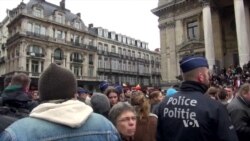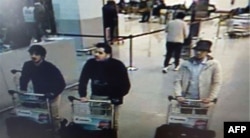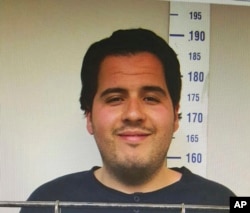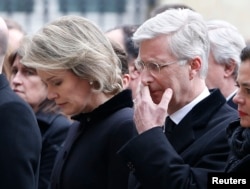European Union justice and security ministers hold talks in Brussels Thursday on ways to shore up intelligence and security, as police search for yet another suspect in the attacks in the Belgian capital that killed at least 31 people and wounded 300 others.
Police have launched a manhunt for a second man who appears involved in the suicide bombing at Maelbeek metro station Tuesday morning, Belgian media report. Authorities earlier identified Khalid El Bakraoui as the assailant in the metro attack that killed 20 people and injured scores more.
But video surveillance at the Maelbeek station showed a second man walking with El Bakraoui carrying a large bag, Belgium’s Le Soir newspaper reported, citing police confirmation.
El Bakraoui’s brother Ibrahim has been formally identified as one of the two suicide bombers in the airport attacks that occurred the same morning. Media have identified the second bomber as Najim Laachraoui, a bombmaker for Islamic State, who is considered a key accomplice in the November Paris attacks.
A third man, captured in airport video pushing a trolley with the two suicide bombers, remains at large.
Islamic State claims responsibility
The Islamic State group has claimed responsibility for the Brussels attacks, as it did for the Paris attacks in November.
Indeed, mounting evidence points to increasingly closer links between the Brussels and Paris terrorist strikes, raising questions about lapses in cross-border intelligence and security cooperation.
Those questions will be at the forefront of the EU meeting Thursday afternoon.
“We need to have a union of security,” European Commission President Jean-Claude Juncker said at a news conference in Brussels Wednesday, urging member states to adopt the Commissions proposals on tighter external border controls and measures to make it more difficult to acquire firearms within the EU.
Visa-free system
Europe’s visa-free Schengen system, already threatened by the migrant influx, is also under fresh scrutiny.
Much of the attention centers on Belgium, as authorities here are increasingly pressured to explain how a terrorist network apparently managed to plot and carry out two attacks — in Paris and Brussels — within months.
Turkish authorities said Wednesday they had caught Ibrahim El Bakraoui in 2013 at the Syrian border and deported him to the Netherlands.
“Despite our warnings that this person was a foreign terrorist fighter, the Belgian authorities could not identify a link to terrorism,” Turkish President Recep Tayyip Erdogan told reporters Wednesday.
For their part, Belgian authorities say the El Bakraoui brothers were primarily known as criminals who spent time in prison.
Not everyone is pointing fingers.
“Who is at fault in the area of terrorism?” EU Commission President Juncker asked in an interview with Le Soir. “Let’s not start criticizing Belgium. I don’t share this scorn.”
Attack 'almost inevitable'
Michael Hayden, former director of the U.S. National Security Agency, told VOA the attack was "almost inevitable."
"I realize that's a pretty dramatic word," Hayden said. "But if you look at what has happened...the soft targets, the transportation targets, the maximum civilian casualties, (it's) something we could see."
Hayden also said it is "certainly not the last" attack Islamic State will carry out, saying the group has a "network that seems to be active and thriving in the heart of Europe."
The retired four-star general, who also headed up the CIA, said European intelligence and security agencies could do a better job at sharing information.
Counter-terrorism expert Thomas Reynard, of the Brussels-based Egmont Institute, believes cooperation between French and Belgian police is often underestimated.
“It’s not like we just started cooperation,” he said. “Obviously cooperation between police, between intelligence services anywhere in the world — including often within one single country — is also difficult.”
“So is this a case of perfect cooperation - definitely not,” he added. “But what’s important is these remain hiccups rather than a major lack of cooperation.”
Cross-border cooperation
The attacks also point to good cross-border cooperation among the assailants.
A case in point is Salah Abdeslam, a key suspect in the Paris attacks who was caught in a Brussels police raid last week.
On Thursday, his lawyer Sven Mary said he wanted to be transferred to France “rapidly.” Mary also told the French News Agency his client “was not aware” that the Brussels attacks were being plotted.
Yet last week, Belgian Deputy Prime Minister Didier Reynders said Abdeslam told investigators he had been “ready to restart something” in Brussels. Moreover, evidence points to ties between Abdeslam and the Brussels assailants.
Abdeslam and suicide bomber Laachraoui were spotted last September at the the Austria-Hungarian border, driving in a rented Mercedes with a third suspect, Mohamed Belkaid, who was killed during last week’s police raid in the Brussels neighborhood of Forest.
Many other suspects in the Paris and Brussels terrorists attacks also appear united by tangled bonds of childhood friendships, family ties or shared prison terms.
Both attackers included pairs of brothers, underscoring yet another pattern among jihadi fighters, experts say. Salah Abdeslam’s brother Brahim was among the Paris suicide bombers, while the two El Bakraoui brothers both blew themselves up in the Paris attacks.
Belgians mourn victims
Meanwhile, the country remains in mourning for the victims of the Brussels attacks. Flags are at half-staff, and another moment of silence was to be held Thursday afternoon for the victims.
At the Place de la Bourse, in downtown Brussels, a steady stream of visitors arrived to place candles and flowers at a makeshift shrine. Hundreds gathered for a second consecutive night on Wednesday to sing and post messages of peace and Belgian pride.
“I came came here to show I wasn’t afraid,” said 85-year-old Nicole Olyff who wandered around the square. “And I’m happy to see there are still tourists in Brussels and so many people coming here.”









